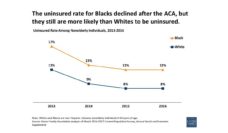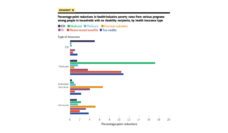The Affordable Care Act (ACA) has survived 70 repeal attempts and wavering public support. In the eight years since its passage, approximately 20 million Americans have gained health insurance coverage through either the private marketplace or state-based Medicaid expansion. However, the uninsured rate is still nine percent nationally, so it is important to look at where further improvements are possible.
The figure above, from the Kaiser Family Foundation, reveals racial disparities in health insurance coverage among non-elderly adult and children. Although all races saw decreases in the uninsured rate between 2013 and 2016, Hispanic and Black adults are still more likely to be uninsured compared to their White counterparts.
In 2016, Hispanic and Black adults were also less likely than White adults to have private insurance and more likely to use Medicaid or Medicare. Despite significant gains in coverage for Hispanic adults, 22 percent remain uninsured. And unfortunately, many of the uninsured Black adults live in states that have yet to expand Medicaid, which also limits their options.
For both adults and children, racial disparities in health insurance coverage persist. Given the ongoing attacks on the ACA, these disparities are unlikely to be meaningfully addressed in the near future.
Hispanic and Black children, too, have higher uninsured rates than White children, though the magnitude of the difference is less than the adult population. This lower magnitude can largely be attributed to coverage through the Children’s Health Insurance Program, which provides low-cost health insurance to families whose income is too high to qualify for Medicaid.
For both adults and children, racial disparities in health insurance coverage persist. Given the ongoing attacks on the ACA, these disparities are unlikely to be meaningfully addressed in the near future. Over the last two years, the Trump administration has spent less money to advertise how and when Americans can find insurance coverage and has failed to assist those seeking coverage through the ACA marketplace. Meanwhile, 15 states have either applied for or enacted work requirements for Medicaid, creating another barrier to accessing insurance. At least for now, health care in the United States very much remains a privilege and not a right.
Databyte via Samantha Artiga, Kendal Orgera, and Anthony Damico, Changes in Health Coverage by Race and Ethnicity since Implementation of the ACA, 2013-2017. Kaiser Family Foundation.














